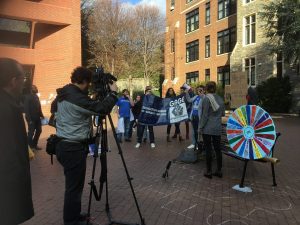The university announced today in an email to all resident assistants (RAs) that it would not voluntarily recognize their unionization with OPEIU Local 153, as the Georgetown Resident Assistant Coalition (GRAC) requested last Friday in a letter delivered to the President’s office. The response sets the tables for an election, likely to be held next month, in which RAs will be able to vote on whether to form a union.
Vice President for Student Affairs, Eleanor Daugherty, explained in her email that Georgetown believes the election is an important step in the process, in order to “ensure that each RA has the opportunity to exercise their individual and voluntary choice, through an election, to determine if they wish to be represented by a union.” The election would be administered via secret ballot by the National Labor Relations Board (NLRB), with whom GRAC has already filed the necessary petition.
NLRB guidelines call for an election to be held as soon as is convenient, with ample time to post notices. Organizers have previously said they aim to hold the election sometime in mid- to late-April.
“All of the other unions that represent employees at Georgetown have been established through a secret ballot election process,” Dr. Joseph Ferrara, chief of staff to President Degioia, wrote to GRAC organizers in a separate email obtained by the Voice.
“The Georgetown Resident Assistant Coalition respects the decision of the University to proceed with an election,” Sam Lovell (CAS ‘25), an organizer with GRAC, wrote in an email to the Voice. “We commend the University’s commitment to remaining independent and neutral.”
The university will be represented in the matter by Jonathan Fritts (LAW ’98), a lawyer for the firm Morgan, Lewis & Bockius, who has represented Georgetown in labor relations in the past.
Morgan, Lewis & Bockius is one of the largest law firms in the country, and has been hired by various large corporations, including Amazon and Trader Joe’s recently, to dissuade employees from unionizing with tactics organizers have called union-busting.
When RAs at George Washington University sought to unionize in 2017, Fritts and the firm represented GW and argued to the NLRB that they should not have the right to unionize because their relationship to their university “fundamentally depends on their status as students,” according to the Chronicle of Higher Education.
The NLRB ruled in that case that the RAs could unionize, a landmark decision, but the union set to represent them, SEIU Local 500, unexpectedly withdrew the day before the election, and the RA union at GW never materialized.
Following the 2017 decision, there was a unionization push among Georgetown’s RAs in 2019, but it fizzled out before an election could be scheduled.
GRAC has now gotten further than those organizers did, with a formal election petition filed. They are seeking equitable compensation, an end to mistreatment they experience from their supervisors, increased resources for emergency situations, and consistent resident to advisor ratios. Since the release of the statement, GRAC has received support from GUSA in the form of a statement passed unanimously by the Senate, which has also garnered over 300 signatures.
“We thank the Georgetown community for their support, and we look forward to Resident Assistants having the chance to once again affirm their support for an RA Union in the coming weeks,” Lovell wrote.







